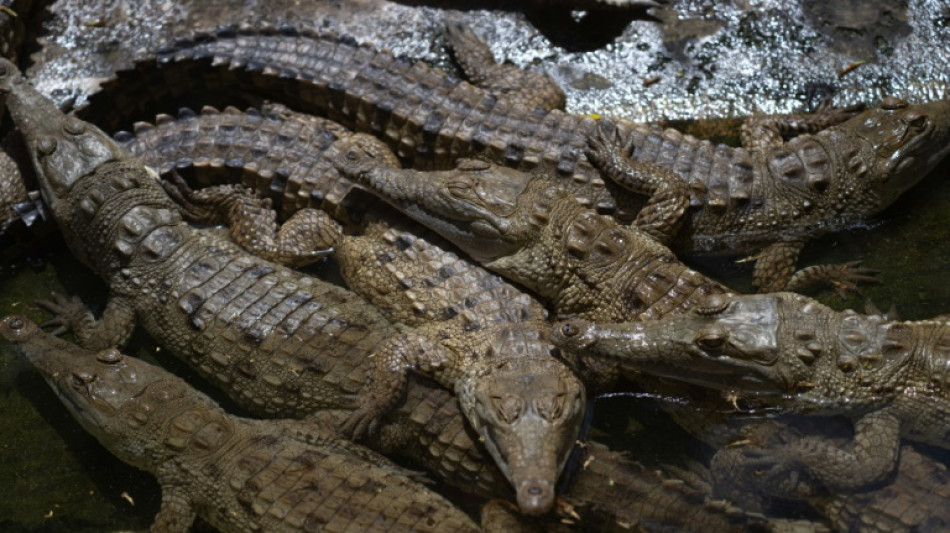
-
 French court cracks down on Corsican language use in local assembly
French court cracks down on Corsican language use in local assembly
-
Russia expels UK diplomat accused of espionage

-
 Israeli security cabinet to discuss ceasefire as US says deal 'close'
Israeli security cabinet to discuss ceasefire as US says deal 'close'
-
COP29 president blames rich countries for 'imperfect' deal

-
 No regrets: Merkel looks back at refugee crisis, Russia ties
No regrets: Merkel looks back at refugee crisis, Russia ties
-
IPL history-maker, 13, who 'came on Earth to play cricket'

-
 Prosecutors seek up to 12-year terms for French rape trial defendants
Prosecutors seek up to 12-year terms for French rape trial defendants
-
Laos hostel staff detained after backpackers' deaths

-
 Hong Kong LGBTQ advocate wins posthumous legal victory
Hong Kong LGBTQ advocate wins posthumous legal victory
-
Rod Stewart to play Glastonbury legends slot

-
 Winter rains pile misery on war-torn Gaza's displaced
Winter rains pile misery on war-torn Gaza's displaced
-
'Taiwan also has baseball': jubilant fans celebrate historic win

-
 Russia pummels Ukraine with 'record' drone barrage
Russia pummels Ukraine with 'record' drone barrage
-
Paul Pogba blackmail trial set to open in Paris

-
 Landmine victims gather to protest US decision to supply Ukraine
Landmine victims gather to protest US decision to supply Ukraine
-
Indian rival royal factions clash outside palace

-
 Manga adaptation 'Drops of God' nets International Emmy Award
Manga adaptation 'Drops of God' nets International Emmy Award
-
Philippine VP denies assassination plot against Marcos

-
 Hong Kong's legal battles over LGBTQ rights: key dates
Hong Kong's legal battles over LGBTQ rights: key dates
-
US lawmakers warn Hong Kong becoming financial crime hub

-
 Compressed natural gas vehicles gain slow momentum in Nigeria
Compressed natural gas vehicles gain slow momentum in Nigeria
-
As Arctic climate warms, even Santa runs short of snow

-
 Plastic pollution talks: the key sticking points
Plastic pollution talks: the key sticking points
-
Indonesia rejects Apple's $100 million investment offer

-
 Pakistan police fire tear gas, rubber bullets at pro-Khan supporters
Pakistan police fire tear gas, rubber bullets at pro-Khan supporters
-
Hong Kong same-sex couples win housing, inheritance rights

-
 Indonesia digs out as flooding, landslide death toll hits 20
Indonesia digs out as flooding, landslide death toll hits 20
-
Liverpool's old guard thriving despite uncertain futures

-
 Mbappe takes reins for Real Madrid in Liverpool clash
Mbappe takes reins for Real Madrid in Liverpool clash
-
As AI gets real, slow and steady wins the race

-
 China's Huawei to launch 'milestone' smartphone with homegrown OS
China's Huawei to launch 'milestone' smartphone with homegrown OS
-
Porzingis and Morant make triumphant NBA returns

-
 Hong Kong top court affirms housing, inheritance rights for same-sex couples
Hong Kong top court affirms housing, inheritance rights for same-sex couples
-
Philippines, China clashes trigger money-making disinformation

-
 Most Asian markets drop, dollar gains as Trump fires tariff warning
Most Asian markets drop, dollar gains as Trump fires tariff warning
-
England 'not quivering' ahead of New Zealand Test challenge

-
 Bethell to bat at three on England Test debut against New Zealand
Bethell to bat at three on England Test debut against New Zealand
-
Trump vows big tariffs on Mexico, Canada and China

-
 New Zealand and England to play for Crowe-Thorpe Trophy
New Zealand and England to play for Crowe-Thorpe Trophy
-
Scheffler, Schauffele and McIlroy up for PGA Player of the Year

-
 Trump to face less internal pushback in new term: ex-commerce chief
Trump to face less internal pushback in new term: ex-commerce chief
-
Extreme weather threatens Canada's hydropower future

-
 More than 34,000 register as candidates for Mexico judges' election
More than 34,000 register as candidates for Mexico judges' election
-
Australia ban cycling's Richardson for life after UK defection

-
 Internal displacement in Africa triples in 15 years: monitor
Internal displacement in Africa triples in 15 years: monitor
-
'Remarkable global progress': HIV cases and deaths declining

-
 Social media firms raise 'serious concerns' over Australian U-16 ban
Social media firms raise 'serious concerns' over Australian U-16 ban
-
Tiger to skip Hero World Challenge after back surgery

-
 MLB shifts six 2025 Rays games to avoid weather issues
MLB shifts six 2025 Rays games to avoid weather issues
-
US women's keeper Naeher retiring after Europe matches


Fighting to save Venezuela's Orinoco Crocodile
Venezuela's Orinoco Crocodile is a fearsome beast, but its enormous size and sharp teeth were no match for humans who hunted them to the brink of extinction.
Millions were slaughtered in the 20th century, mainly for their skins, and today, only about 100 adult females are left in Venezuela, according to the country's Fudeci natural sciences foundation.
Known to scientists as Crocodylus intermedius, the enormous reptile is native to the Orinoco basin that Venezuela shares with Colombia.
It can grow to more than six meters (19.7 feet) in length and over 400 kilograms (882 pounds), making it one of the largest crocodiles in the world.
According to the International Union for Conservation of Nature, it is critically endangered, having suffered an 80-percent population reduction in just three generations in the early and mid-1900s.
More than 2.5 million Orinoco Crocodile skins were exported from Venezuela from 1931 to 1934, according to official Venezuelan figures.
Today, such trade is prohibited but the threat persists: the crocs are killed for their eggs and meat, and sometimes out of fear. And their habitat is ever shrinking and defiled by pollution.
Efforts that started in 1990 to breed new crocs in captivity have seen some 10,000 freed back into the Venezuelan wild.
But their numbers have not significantly increased.
"We do a part... to raise the animals and then release them, but after that it no longer depends on us, there has to be protection of these animals, surveillance, control, there has to be environmental education," conservationist Federico Pantin told AFP.
Pantin, 56, manages the Leslie Pantin breeding zoo -- named after his father who founded it -- with his wife Tuenade Hernandez in the northern state of Aragua. It is one of several croc breeding centers in the country.
- 'Seeds of conservation' -
On Sunday, Pantin was on hand for the release of 160 hatchlings -- small and green-skinned with black spots and light eyes -- into the Capanaparo River.
The zoo's captive breeding pair produces about 40 eggs at a time.
The eggs are incubated for about 90 days in very specific conditions, buried in sand at a depth of 33 centimeters, at a temperature of between 30 and 34 degrees Celsius (86-93 degrees Fahrenheit) and humidity of 85-90 percent.
The crocodiles mostly hatch in May, and at about one year of age, they are freed.
Zoo staff also capture free-born baby crocs in the river to raise them in relative safety.
"Predation in the natural environment is very high" with birds, fish and other reptiles all feeding on the defenseless hatchlings, explained Pantin.
By raising them at the zoo, 95 percent of the hatchlings survive -- whereas most would have died in their natural environment.
"The animals arrive here about 24 centimeters (9.4 inches) long and weighing about 80 or 100 grams (2.8-3.5 ounces)... we release them when they reach about 80 or 90 centimeters and weigh four kilos," said Pantin.
According to Diego Bilbao, director of a company called Rio Verde which organizes tours to witness the annual release of young crocs, the sector holds potential for tourism income with a conservational side benefit.
If locals and Indigenous communities can be convinced to see the crocs as a source of income, he explained, "they help protect it."
The Pantin Zoo, which also works to conserve other threatened species such as the Red Siskin finch, the stubfoot toad and the wood turtle, also seeks to instill a natural stewardship mindset in visiting school groups.
"I love it," said Hernandez of this part of her job. "The seeds of conservation are sown at a young age."
R.Veloso--PC


